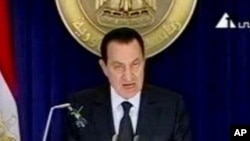Egyptian President Hosni Mubarak has appeared on national television for the first time since protesters took to the streets demanding his ouster. In a televised speech late Friday, Mr. Mubarak promised to implement political and economic reforms.
|
Key Players in Egypt's Crisis
|
The 82-year-old Egyptian ruler ordered his Cabinet to step down and promised to appoint a new Cabinet Saturday. He also said the days of protests this week were a plot to destabilize Egypt.
In Washington, President Barack Obama, in an address from the White House Friday evening, asked the Egyptian government to refrain from violence against peaceful protesters and restore Internet and communication services that have been cut off.
Mr. Obama said he spoke to Mr. Mubarak and asked him to take "concrete steps" to fulfill his promises of reform made to the Egyptian people.
Buildings continued to burn in in Cairo and tanks patrolled the streets, capping the most violent and chaotic day in Egypt since mass demonstrations began Tuesday.
Tens of thousands of protesters defied the nighttime curfew and continued to demand Mr. Mubarak end his 30-year rule.
Medical officials say at least 13 people were killed in Friday's unrest in Suez. There are reports that more than 100 people have been injured across the country.
Earlier in Washington, White House spokesman Robert Gibbs also said the U.S. would be reviewing its assistance program to Egypt, which tops $1 billion.
Protesters in Cairo surrounded some vehicles belonging to security forces, and at one point rocked an empty troop carrier back and forth before burning it. Demonstrators have also attempted to storm the state television building.
Large fires are visible at several spots in the city, including at the headquarters of the ruling National Democratic Party. Witnesses have reported hearing gunfire in the streets.
Convoys of military vehicles carrying troops poured into Cairo about the time a dusk-to-dawn curfew began.
Soldiers have been patrolling Suez, where police used tear gas, water cannons and clubs to push back demonstrators. Military vehicles also moved into Alexandria.
Related video report of protests by Henry Ridgwell:
News reports said the national carrier Egypt Air suspended flights into Cairo.
Meanwhile, police briefly detained Nobel laureate Mohamed ElBaradei at a mosque in suburban Cairo, Friday. The former U.N. atomic energy chief who returned to Egypt from Austria Thursday, has said he is willing to lead an opposition movement.
Internet service, a key tool for activists, was shut down across the country shortly after midnight. Cell phone text messaging and data plans were also disabled. Telecom company Vodafone says the Egyptian government ordered all mobile telephone operators to suspend service in parts of the country.
Some information for this report was provided by AP and Reuters.
Slideshow of the Egyptian protests




